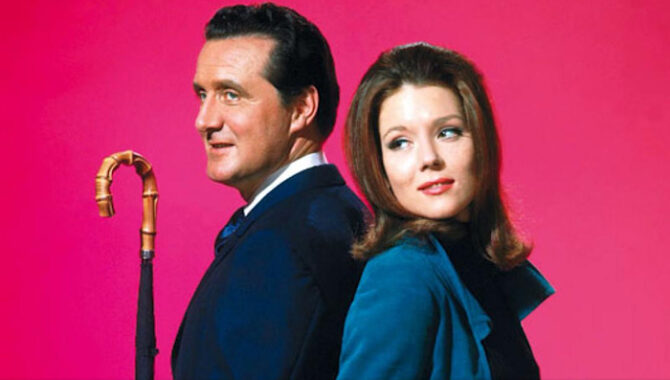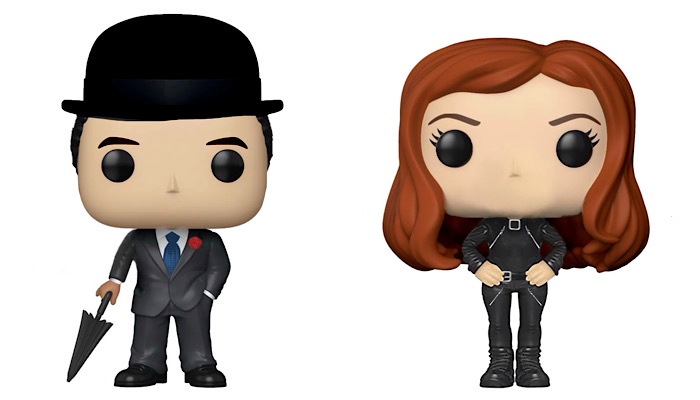—-
To stay in the loop with the latest features, news and interviews from the creative community around licensing, sign up to our weekly newsletter here

“It was truly, tweely bonkers!” Deej Johnson wonders if rebooting the TV show The Avengers is a good idea.
Google ‘The Avengers’ and you won’t be surprised at the results… Page after page of entries for Iron Man, Hulk, Thor, Spider-Man… And yes, I know Spider-Man isn’t officially an Avenger. Let it go – that’s not what this is about. Rather, I want to talk about the quintessentially British TV show, The Avengers.
Running between 1961 and 1969, this odd little cloud of TV Heaven clocked up a grand total of 161 episodes. Now, as rumours persist that the crazy cult favourite is set to make a return, I find myself wondering: should I be rooting for that? I mean: how often does rebooting a show that was beloved in the 1960s prove to be a good idea?
That said, somebody somewhere is giving it serious thought. Over the past few years, several names have come up in relation to a reboot of what many feel is an all-time classic show. Among the great and the good said to have toiled away on a script are Shane Black, Fred Dekker, Mickey Down and Konrad Kay. Meanwhile, Sex Education’s Ben Taylor’s name is linked to the project as co-creator and director.
If any of these rumours are true, then the challenge of reviving this peculiar StudioCanal property is enormous. Even the most casual Avengers fans would have to admit that the IP is difficult to get right. In part, that’s because the show varied enormously in tone. At different moments, it was sci-fi, drama, action-adventure, espionage, comedy, parody and a buddy show – sometimes all in one episode. Oftentimes, it was also truly and tweely bonkers! Quite how a production team could mix all those ingredients together jussssst right in a reimagining of this curious cocktail is anyone’s guess.
For evidence of this, look no further than the 1998 film reboot, distributed by Warner Bros. Starring Ralph Fiennes, Uma Thurman and Sean Connery, this turned out to be an absolute shambles. The box office was dreadful – and the reviews were brutal. David Bianculli of the New York Daily News called it “…horrendously, painfully, and thoroughly awful.” Meanwhile, the UK’s Birmingham Post summed it all up by saying, “The Avengers is being slated by critics as the worst film ever made.”

Quite where it went wrong is hard to explain, but many critics pointed to incomprehensible storytelling, a baffling structure – and a distinct lack of chemistry between the leads. In any case, whether you started watching that film as a fan of the original show or not, you almost certainly finished it bored, befuddled or boiling with rage… If you finished it at all. Indeed, the movie version perfectly illustrated how badly reboots can go – and undoubtedly kiboshed the franchise from that day to this.
Looking outside film and TV, the IP tends to exist rather than flourish. The ever-passionate stalwarts at Big Finish have more-than-competently recreated the missing episodes from Series 1 as audio dramas. In non-fiction print, the many years have seen a plethora of loving guides, dossiers and companion books to explore the onscreen adventures. Each of these offers anecdotes, insights and musings from various talking heads…
Elsewhere, a number of book publishers committed fictional adventures to print: a mix of original stories and novelisations. There have also been comic strips and a graphic novel. Another print offering from 1977 was particularly brave: The Authorized Biography of John Steed, by Tim Heald. This so-called life story of the fictional character must have targeted an exceedingly small and niche audience… And then royally pissed off that audience by largely ignoring the established canon of the character!
Moving beyond print, toy company Corgi created a few die-cast vehicles and figures back in the day. Those aside, the toy industry does seem, for the most part, to have given the opportunity to create play figures a miss. Even the mighty Funko has yet to make the IP Pop – and that does seem a bit of a pity. It’s actually quite easy to imagine what those figures might look like… But how easy is it to picture the consumer base for such things?

I say that because whenever I hear people talk about The Avengers being “a classic”, I suspect they mean something quite different. Speaking as an only occasional fan myself, I propose – however ruefully – that The Avengers was a classic show for a number of episodes during Series 4 and 5. The rest of the series – and there were six in total – may not be half as good as people like to think!
In fact, The Avengers is really a collection of vastly different shows. Believe it or not, Series 1 was a comparatively straight and gritty drama. Starring Patrick McNee and Ian Hendry, hardly anyone remembers it since most of the episodes are now lost. Series 2 started to find its feet in the wake of Hendry’s departure. The masterstroke here was making Honor Blackman’s character, Cathy Gale, the equal of Patrick McNee’s John Steed. At a time when television rarely tried to equalise the sexes, The Avengers did it in spades – and style.

As Series 2 progressed, viewers increasingly saw the Cathy Gale character as visibly strong, assertive and independent. She would often physically overpower men and save the day, continually proving herself to be Steed’s equal. That being the case, the production team began to create something much more interesting – but still comparatively safe – by the time they got to the end of Series 3…
Before the start of Series 4, however, Honor Blackman left the show to appear in the James Bond film Goldfinger. Enter Diana Rigg as Emma Peel. The name itself gives a clue as to part of what the producers were hoping to achieve by casting her in the show… Emma Peel derives from ‘M appeal’ – shorthand for ‘Man appeal’. Nevertheless, the tone of the show magically shifted with the arrival of this character…
Along with increasingly surreal scripts, camper tones and a number of sci-fi-driven plots came a mould-breaking on-screen relationship. The mutually flirtatious and intimate dynamic of the two lead characters wasn’t best described as will they/won’t they… It was much more have they/haven’t they – or even are they/aren’t they. And yet nothing conclusive was ever seen on screen. This potently strong and patently obvious chemistry is one of the things that it’s hard to imagine any reboot recreating… The essential dynamic of the leads without a lazy romance to grease the wheels.
Crushingly, Diana Rigg – like Honor Blackman before her – also left the show to appear in a James Bond film. This time it was for the underrated George Lazenby outing, On Her Majesty’s Secret Service. Alas, when The Avengers returned in 1969, a most unpopular casting decision saw Linda Thorson try to fill Rigg’s karate-kicking shoes. Unfortunately, behind-the-scenes pressures had started to take their toll by then…
The delicate balance that worked so well in the previous two series was offset – and things began to look more forced and charmless. The matter wasn’t helped by the 25-year age difference between Patrick MacNee and his leading lady – which seriously changed the onscreen dynamic. And so it was that, without great fanfare, the powers that be cancelled the show.
So… Is there any way a reboot could work today? I can’t see it myself, but if StudioCanal was to announce that The Avengers is coming back and positioning itself somewhere between The X-Files, early Moonlighting and Black Mirror, I’d have thoughts in my head and hope in my heart. There may yet be a way to present this franchise for a modern audience… And I for one would cheer loudly to see it done well.
Enter your details to receive Brands Untapped updates & news.